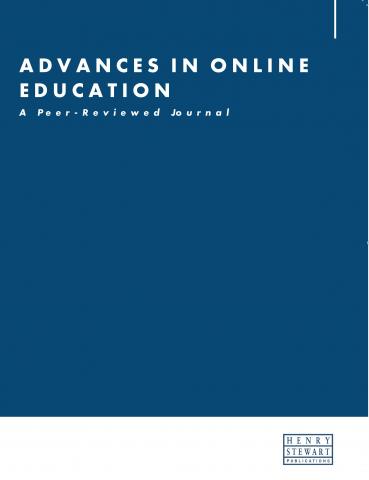"Journal of Digital Media Management is one of the most thoughtful and complete journals on the subject of digital asset management. The articles are written and reviewed by some of the foremost experts in the industry."
Call for Papers
Call for Papers
The Editor, Editorial Board and Publishers of Advances in Online Education: A Peer-Reviewed Journal welcome the submission of articles for the new volume and issues of the journal.
The Journal particularly welcomes papers highlighting emerging trends in online learning, with a focus on new frontiers in methodological approaches, CSCL (computer supportive collaborative learning) environments and technological innovations in the field of online teaching and learning. Best practice papers can be more descriptive of current practice and need not display in-depth knowledge of previous academic work in the field.
Papers submitted to Advances in Online Education: A Peer-Reviewed Journal should make clear how they make a practical contribution to knowledge and/or practice in the field.
The journal considers a range of submission types, including:
• Evaluative studies of technology applications in a learning and teaching provision framework
• Research papers and Case studies of innovations in the area of learning technology
• Reviews of online learning, teaching and technology developments, including reviews of cutting-edge fields of research and emerging technologies
• Editorials (both commissioned and unsolicited) providing topical insights
• Theoretical, philosophical and historical articles that address online education in any of its dimensions
Contributions are invited on the following topics:
• New technologies and technology-enhanced learning
• Emerging issues in management learning and education in all types of settings
• Technology as a learning tool in management education
• Innovative learning methods, concepts, products and models
• Online executive education
• Platforms and technical infrastructure for curation and delivery of online education
• Developing and implementing new methods of production and delivery in Online Distance Learning (ODL) and e-learning
• The scholarship of teaching and learning (SoTL) in management
• Strategic leadership and organisational change in distance and e-learning contexts
• Management styles for distance and e-learning organisational development
• Online course development and instructional design
• Instructional models in online courses
• Learning process design
• Learning management systems
• Teaching methodologies
• The theory and practice of ICT in teaching and professional development
• Teacher and tutor training
• Multimedia approaches; virtual education, e-Learning environments and platforms
• Social networking and learning
• Student engagement with and perceptions of new technologies and experiences with online learning
• Strategies for effective online classroom provision during the Covid-19 pandemic
• Collaborative learning; usability and evaluation of online environments and portals
• Accessibility standards in online instruction
• Online examinations and testing
• Educational psychology
• Primary and secondary distance, online and blended environments
• Implementing distance and e-learning in traditional contexts
• Libraries and web-scale discovery services
• The library and information technology in the age of online education
All articles that go forward for review in Advances in Online Education: A Peer-Reviewed Journal benefit from a double-blinded peer-review process.
The journal has no article processing charges (APCs) and no article submission charges.
Advances in Online Education: A Peer-Reviewed Journal does not solicit advertising or publish advertorials.
Submission Guidelines:
The copy deadline is October 4th 2024 and the following types of articles will be considered for publication:
Articles and case studies can be anywhere from 2,500 to 6,000 words. Review articles and comments should be in the region of 1,500-3,000 words
Manuscript submissions and enquiries should be submitted to the Publishing Editor, Amelia Clarke.
Author guidelines, sample articles and other relevant information about the journal can be found here.


